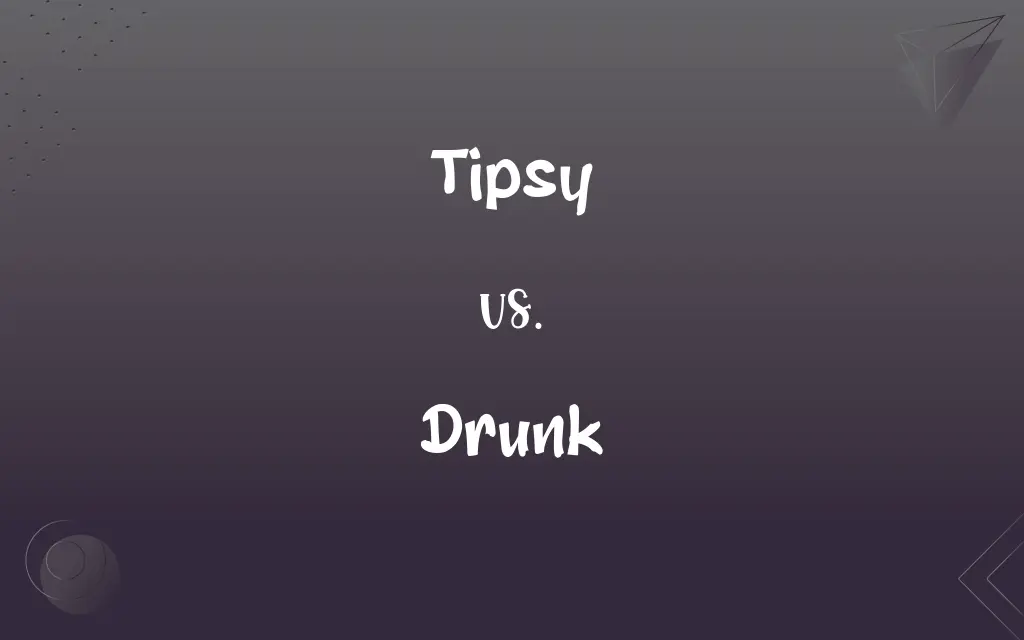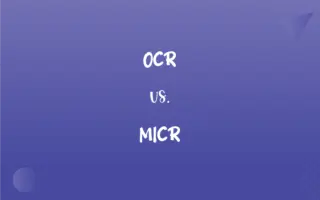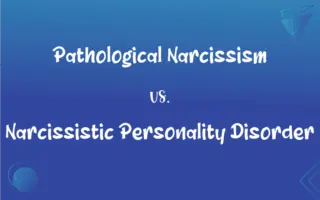Tipsy vs. Drunk: What's the Difference?
Edited by Aimie Carlson || By Janet White || Published on February 21, 2024
Tipsy implies a mild, initial stage of inebriation with slight impairment, while drunk denotes a more advanced state of intoxication with significant impairment.

Key Differences
Tipsy is characterized by slight changes in mood and behavior, often leading to a feeling of light-headedness and increased sociability. Drunk, on the other hand, involves more pronounced changes, including slurred speech, reduced coordination, and altered judgement.
Tipsy individuals usually maintain a level of self-control and awareness, experiencing only minor impairments. Being drunk, however, often results in significant impairments, impacting decision-making and physical abilities.
The transition from tipsy to drunk can be gradual, with tipsiness being the first noticeable sign of alcohol's effects. As alcohol consumption increases, the state of being drunk becomes apparent through more obvious and disruptive symptoms.
Tipsy is often seen as a more socially acceptable and manageable state, sometimes even sought after for its mild euphoria. Drunkenness, in contrast, is generally viewed negatively, associated with loss of control and potential for negative consequences.
A tipsy person might engage in lively conversation or feel a boost in mood. A drunk person, however, might struggle with basic tasks, exhibit emotional extremes, or engage in risky behavior.
ADVERTISEMENT
Comparison Chart
Level of Intoxication
Mild, initial stage of inebriation
Advanced stage of intoxication
Behavioral Changes
Slight mood and behavior changes
Pronounced changes, including slurred speech
Self-Control
Generally maintained
Often significantly reduced
Physical Coordination
Minor impairment
Substantial impairment
Social Perception
Seen as manageable and sometimes desirable
Viewed negatively, associated with loss of control
ADVERTISEMENT
Tipsy and Drunk Definitions
Tipsy
Slightly intoxicated in a cheerful, light-headed way.
After two glasses of wine, she felt tipsy and laughed more freely.
Drunk
Excessively inebriated, often leading to loss of control.
He became drunk and started singing loudly in the street.
Tipsy
Experiencing a mild euphoria from alcohol without major impairment.
At the party, he was just tipsy enough to enjoy dancing.
Drunk
Overcome by alcohol to the point of disorientation or unconsciousness.
She was so drunk at the party that she passed out on the couch.
Tipsy
Exhibiting minor signs of alcohol influence, such as increased sociability.
They were all tipsy and shared stories more openly than usual.
Drunk
Under the strong influence of alcohol, leading to significant impairment.
They were drunk and incapable of making sensible decisions.
Tipsy
Having slight but noticeable effects from alcohol.
She was tipsy and spoke with a relaxed, uninhibited tone.
Drunk
In a state of heavy intoxication affecting speech, coordination, and judgement.
He was so drunk that he couldn't walk straight.
Tipsy
Feeling a slight buzz from alcohol, but still in control.
He felt tipsy after the champagne toast, yet still composed.
Drunk
Severely impaired by alcohol, often leading to overtly altered behavior.
After the bar crawl, she was clearly drunk and very loud.
Tipsy
Slightly intoxicated.
Drunk
Past participle of drink.
Tipsy
Unsteady or crooked.
Drunk
Intoxicated with alcoholic liquor to the point of impairment of physical and mental faculties.
Tipsy
Slightly drunk, fuddled, staggering, foolish as a result of drinking alcoholic beverages.
Tipsy
(metonymy) Unsteady, askew.
Tipsy
Being under the influence of strong drink; rendered weak or foolish by liquor, but not absolutely or completely drunk; fuddled; intoxicated.
Tipsy
Staggering, as if from intoxication; reeling.
Midnight shout and revelry,Tipsy dance and jollity.
Tipsy
Very drunk
FAQs
Can you drive when tipsy?
It's unsafe and often illegal to drive even if only tipsy.
What defines being tipsy?
Mild intoxication with slight impairment.
What does being drunk mean?
A state of advanced intoxication with significant impairment.
Is it dangerous to be drunk?
Yes, it can lead to risky decisions and health risks.
How much alcohol typically makes one tipsy?
It varies by individual, but generally 1-2 drinks.
Are drunk individuals aware of their state?
Awareness varies, but judgement is often impaired.
Can you quickly sober up from being drunk?
Sobering up takes time and cannot be rushed.
Does personality affect how one gets tipsy?
Individual factors like weight, tolerance, and mood can influence it.
Is tipsy the same as buzzed?
They're similar, with tipsy being slightly more intoxicated.
Is tipsiness easy to recognize?
It can be subtle, often noticed in mood changes.
Do people act differently when tipsy?
Yes, they may be more relaxed or sociable.
How does alcohol affect someone who's drunk?
It can lead to slurred speech, poor coordination, and altered judgement.
Do all cultures view tipsiness the same?
Cultural attitudes towards tipsiness vary widely.
Can food prevent getting drunk?
Food can slow alcohol absorption but not prevent intoxication.
How long does being tipsy last?
It varies but usually lasts a few hours.
Can tipsiness turn into drunkenness?
Yes, with more alcohol consumption.
Is drunk driving illegal everywhere?
Yes, it's illegal and highly dangerous in all regions.
Is it possible to be drunk without realizing it?
Yes, especially in individuals with high alcohol tolerance.
Are there health risks to frequently getting drunk?
Yes, frequent heavy drinking poses serious health risks.
How does one recover from being drunk?
Time, hydration, and rest are key for recovery.
About Author
Written by
Janet WhiteJanet White has been an esteemed writer and blogger for Difference Wiki. Holding a Master's degree in Science and Medical Journalism from the prestigious Boston University, she has consistently demonstrated her expertise and passion for her field. When she's not immersed in her work, Janet relishes her time exercising, delving into a good book, and cherishing moments with friends and family.
Edited by
Aimie CarlsonAimie Carlson, holding a master's degree in English literature, is a fervent English language enthusiast. She lends her writing talents to Difference Wiki, a prominent website that specializes in comparisons, offering readers insightful analyses that both captivate and inform.







































































